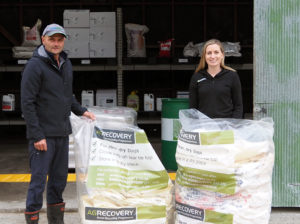
Stephanus Roode of Fresh Max in Hawke’s Bay with Operations Advisor Felicity Mitchell
Free recycling of plastic agricultural bags is available to farmers and growers as rural recycling programme Agrecovery turns up the dial on sustainability.
Recycling of bags made from low density polyethylene (LDPE) plastic is underway in Marlborough and Hawke’s Bay ahead of a nationwide rollout – following successful trials held in the regions last year.
Agrecovery’s Operations Advisor Felicity Mitchell says that “the success of the trials and the enthusiasm of farmers and growers is behind the move to a permanent solution for the bags which are used for fertiliser and fungicides. Our focus is now on finding other sites around the country for collecting the plastic and engaging more manufacturers to support the programme.
“LDPE is a low-quality plastic, making it more difficult to recycle, but we don’t want it being burnt or buried on farms. We’re passionate about finding the most sustainable solution for all the products we collect,” adds Mitchell.
After 15 years of offering container and drum recycling, the not-for-profit organisation is partnering with agricultural manufacturers to clear more plastic from farms. “We’re extremely proud to have BASF and Yara, who have supported HDPE recycling with us for many years, come on the soft plastic journey with us,” says Agrecovery Chief Executive Tony Wilson.
“We’ve been working with Agrecovery on recycling solutions for BASF product packaging for over 10 years and we’re thrilled to now include our Kumulus® DF and Polygram® DF bags in the recycling scheme,” said Fenton Hazelwood, BASF’s National Commercial Manager and Country Manager New Zealand. “It is important that we all play a role in creating a sustainable future and through this partnership with Agrecovery we’re proud to make it easier for farmers to have a positive impact on the environment.”
Yara has supported Agrecovery’s HDPE recycling scheme since its inception and, with BASF, has helped initiate the scheme. The company’s mission is to “responsibly feed the world and protect the planet” says its Agronomy & Crop Solutions Manager David Spencer, “so, when we had the opportunity to participate in the new LDPE plastics recycling programme, we didn’t hesitate.
“Growers have had little option but to burn or send their LDPE bags to landfill. This initiative represents a significant milestone in reducing the environmental impact of plastic packaging,” adds Spencer.
New Zealand’s largest wine producer Indevin partnered with Agrecovery on the recycling trial and is pleased to see the scheme being rolled out. Introducing soft plastic recycling “is another step forward to further reducing waste and meeting our sustainability goals”, says Rhys Hall Assistant Manager of Bankhouse Estate – one of the company’s Marlborough sites.
Farmers will also be pleased to have somewhere to recycle LDPE bags, says Chris Allen, an Ashburton farmer, National Board Member of Federated Farmers and their spokesperson on waste management issues. “We’ve had little option but to stockpile, repurpose or bin them. I’m sure many farmers will be with me in wanting those bags gone to a new home before they are destroyed by pests or sunlight.
“I’ll be encouraging Feds members to participate in the scheme,” enthuses Allen.
This initiative is part of a broader plan that Agrecovery is developing, with the government and industry, to set up product stewardship schemes for the sector.
“We want to raise the game to achieve better environmental outcomes for rural communities by removing plastic from farms. This is something that farmers have been asking us to do for years, so we’re excited to be providing sustainable options for more plastic types.
“It will be successful because everyone is committed to making it work – from the manufacturer to the growers and farmers. It will be successful at meeting farmer and grower sustainability requirements,” says Wilson.
Article and image sourced from AgRecovery.
